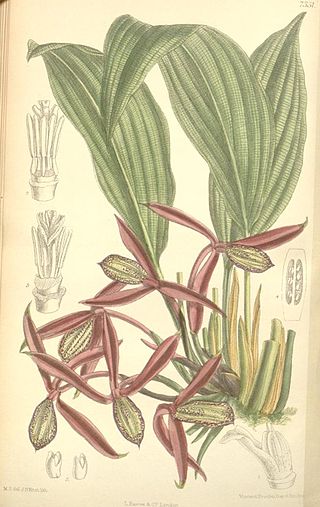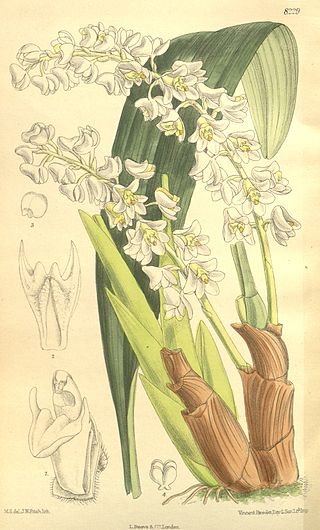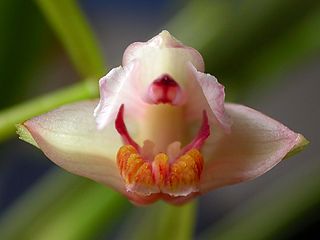
Orchidantha is a genus of flowering plants. In the APG III system, it is placed in the family Lowiaceae, as the sole genus. It includes the plants in the formerly recognised genera Lowia and Protamomum.

Spergula is a genus of flowering plants in the family Caryophyllaceae. Their usual English name is spurry or spurrey. Commonly found in grassland, the genus originated in the northern hemisphere.

Iresine is a genus of flowering plants in the family Amaranthaceae. It contains 20 to 25 species, all of which are native to the American tropics. The generic name is derived from the Greek word εριος (erios), meaning "wooly", referring to the trichome-covered flowers. Bloodleaf is a common name for those species that have colored foliage, and these are often cultivated as ornamental plants. Some species are additives to versions of the hallucinogenic drink ayahuasca.

Hebanthe erianthos, known as suma or Brazilian ginseng, is a species of plant in the family Amaranthaceae. The specific epithet is also spelt "eriantha", although the basionym is Iresine erianthos.

Pfaffia is a genus of plants in the family Amaranthaceae.

Hebanthe is a genus of flowering plant in the family Amaranthaceae, native to Mexico to southern tropical America. The genus was first described by Carl von Martius.

Bryobium, commonly known as urchin orchids or 藓兰属 , is a genus of flowering plants in the family Orchidaceae. Orchids in this genus are epiphytic or lithophytic plants with large, fleshy pseudobulbs, each with up to three leathery leaves and small, often hairy flowers. These orchids are found from tropical Asia to northern Australia.

Dendrolirium is a genus of orchids. Dendrolirium is abbreviated Ddlr. in the horticultural trade.

Pinalia, commonly known as gremlin orchids, is a genus of flowering plants in the family Orchidaceae. Orchids in this genus are large epiphytic or lithophytic plants with prominent pseudobulbs, each with up to three thin, flat leaves and cup-shaped, relatively short-lived flowers with scale-like brown hairs on the outside. There are about 120 species occurring from tropical to subtropical Asia to the south-west Pacific.

Brachycorythis is a genus of flowering plants from the orchid family, Orchidaceae. It contains approximately 40-50 species native mostly to Africa and Madagascar but also some from South and East Asia.

Cryptochilus is a genus of flowering plants from the orchid family, Orchidaceae. Its species are native to China, the Himalayas, and Indochina.

Pteroceras is a genus of flowering plants from the orchid family, Orchidaceae. It is native to China, the Indian Subcontinent, and Southeast Asia.

Porpax is a genus of epiphytic orchids native to southern and southeastern Asia from India to Yunnan to Borneo. As of March 2021, Plants of the World Online accepts the following species:
Bambuseria bambusifolia is a species of plant within the orchid family. It is native to Assam, China, India, Laos, Myanmar, Thailand, and Vietnam.
Quaternella is a genus of flowering plants in the amaranth family Amaranthaceae, endemic to Brazil. They are shrubs or subshrubs found mostly in the cerrado biome.
Bambuseria is a genus of flowering plants belonging to the family Orchidaceae.
Pedersenia is a genus of flowering plants belonging to the family Amaranthaceae.
Hebanthodes is a monotypic genus of flowering plants belonging to the family Amaranthaceae. The only species is Hebanthodes peruviana.
Strongyleria is a genus of flowering plants belonging to the family Orchidaceae.

Ophrys holosericea, the late spider orchid, is a species of flowering plant in the family Orchidaceae, native to western and central Europe and the Mediterranean region. There has been considerable confusion about the identity of this species and the correct spelling of its name.












